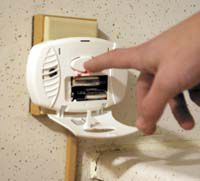| A Carbon County resident checks the carbon monoxide detector in his home. Carbon monoxide and smoke detectors should be tested and batteries replaced regularly, according to the manufacturer’s instructions. |
As temperatures drop in the winter, firefighters respond to an increased number of calls to where residents report smoke, flames and problems associated with heating homes.
Price Fire Chief Paul Bedont said he had anticipated an increased number of calls due to home heaters when winter arrived in the area.
But through the recent cold spell, Carbon County has been relatively quiet as far as fire reports.
In a report issued last week, the National Fire Protection Association reported that fireplaces, heaters, stoves, water heaters and similar appliances account for many of these calls.
To prevent the catastrophes associated with home heater accidents, fire agencies have worked to educate members of the public on the need to lower fire risk in their homes. Indicated by the lower number of reported house fires, Carbon County residents appear to be hearing the message.
“It’s been a pleasant surprise,” said Bedont.
And while the Price department has not been dispatched to many fires recently, there has been an increase in the number of calls from individuals around the county asking where they can hire a chimney sweeper and how to take other preventative steps.
The Price fire chief attributed the increased prevention efforts by residents and fewer emergency responses by the department to education efforts and public awareness campaigns.
“People are being conscious about it,” said Bedont.
While that’s a good sign, the fire chief pointed out that residents should be careful when installing prevention systems and make sure the devices are properly installed.
Shortly after the holidays, firefighters respond to an increased number of calls stemming from carbon monoxide concerns.
Many of the calls are due to improper installation of detectors received as gifts during the holidays. Bedont urged area residents to follow instructions carefully to ensure that detectors work properly when they are needed.
The NFPA reported last week that space heaters seem to be more problematic than central heating systems.
Portable heaters are frequently placed too close to combustible materials.
The appliances are more likely to cause problems because people interact with smaller heaters more frequently as they fuel, maintain and operate the units.
Another area of public safety concern is fireplaces.
While they account for just more than one-fourth of all home heating fires, fireplaces are the most deadly, accounting for three-fourths of the deaths.
To keep fire dispatch numbers down, Carbon County residents have been encouraged to continue efforts to prevent fires and related problems.
The NFPA suggests several steps for safe heating. Carbon County residents are encouraged to:
•Maintain a three feet (or one meter) separation between things that can burn and heating equipment.
•When buying a new space heater, make sure it carries the mark of an independent testing laboratory and is legal for use in the community
Some communities do not permit portable kerosene heaters, for example.
•Install stationary space heaters according to manufacturer’s instructions or applicable codes.
Better yet, people should consider having stationary heaters installed by a professional.
•Plug electric-powered space heaters into an outlet with sufficient capacity.
People should never plug electrical space heaters into an extension cord.
•Use the proper grade of the proper fuel for liquid-fueled space heaters.
People should never use gasoline in a heater not approved for gasoline use.
Residents should refuel only in a well-ventilated area and when the equipment is cool.
•In fireplaces or stoves, use dry, seasoned wood to avoid the build-up of creosote – an oily deposit. Creoso te easily catches fire and accounts for most chimney fires and the largest share of home heating fires generally. Use only paper or kindling wood, not a flammable liquid, to start the fire. Do not use artificial logs in wood stoves.
•Make sure fireplaces have sturdy screens to prevent sparks from flying into the room. Allow fireplace and wood stove ashes to cool before disposing in a metal container, which is kept a safe distance from the home.
•Turn off space heaters whenever the room they are in is unoccupied or under circumstances when manufacturer’s instructions say they should be turned off. Portable space heaters are so easy to knock over in the dark that they should be turned off when you go to bed, but make sure your primary heating equipment for bedrooms is sufficient to avoid risks to residents from severe cold.
•Do not use ovens to heat homes.
•Make sure fuel-burning equipment is vented to the outside. Make sure the venting is kept clear and unobstructed, and that the exit point is properly sealed around the vent, all of which is to make sure deadly carbon monoxide does not build up in the home.
•Inspect all heating equipment annually, and clean as necessary.
•Test smoke alarms monthly; install a carbon monoxide alarm in a central location outside each sleeping area.

